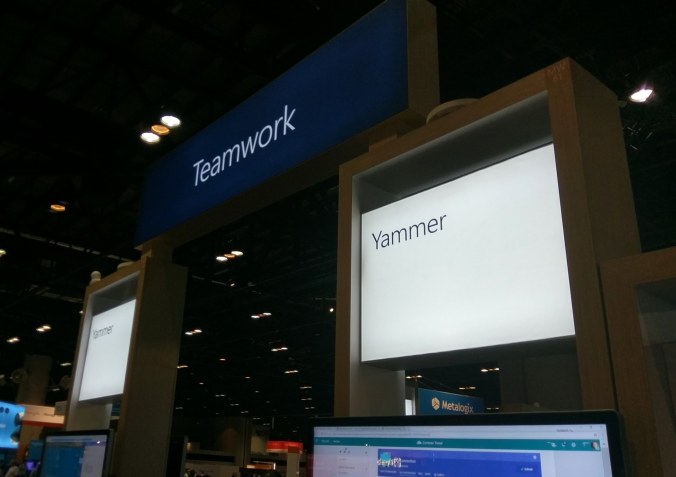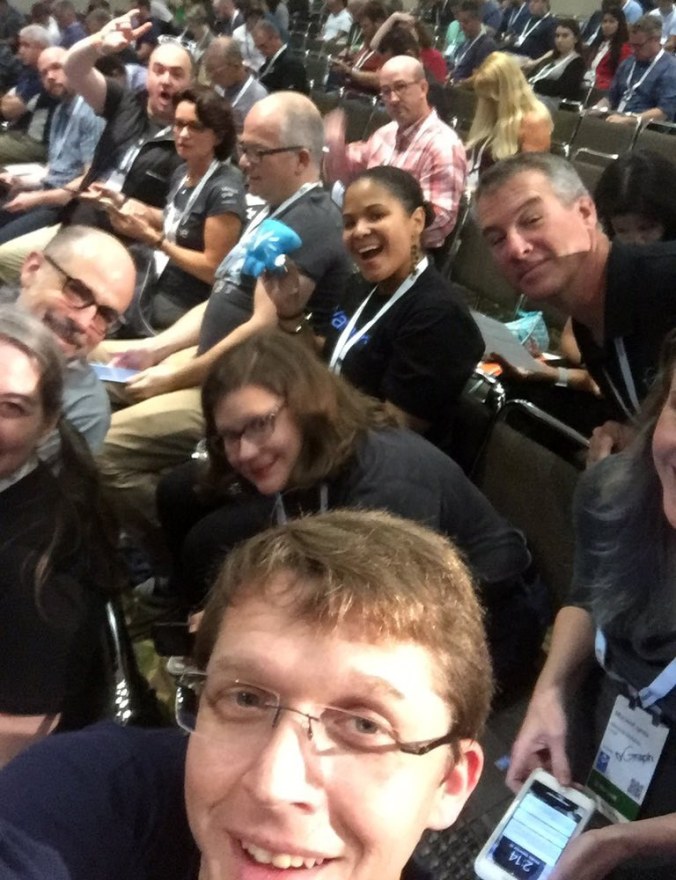
This morning, I read Peter Furtado’s article, Yammer—Cinderella or Sleeping Beauty?
I was considering as my blog post title, “Yammer Has Never Been a Cinderella Or a Sleeping Beauty” or, more succinctly, “Yammer—It Aten’t Dead.” (tm Terry Pratchett)
I mean, I get it: If you haven’t ever used Yammer, or if you set it up once and let it languish, you may well believe the platform is useless if not mostly dead.
But Yammer never has been useless or even close to dead, and from the looks of it, isn’t going to be anytime soon.
Microsoft Ignite 2017 revealed some pretty awesome enhancements for Yammer, both in itself and in relation to further integration with the Office 365 suite. We were all a bit excited about them, believe me. . .

Yammer peeps at Ignite 2017
. . .and I do appreciate how Furtado urges people to give Yammer another chance, up to and including negating expensive third-party platforms if you’re already a Microsoft shop. I can’t be certain, but he could even be pro-Yammer, or at least pro-change-your-perception.
Still, a couple of the points raised in the article are oft mentioned and just don’t fit with my personal Yammer experience. Even without my own proven, practical applications, these perceptions could adversely affect people thinking of trying it for themselves, even with the enhancements.
To wit:
- Yammer is about conversation, not actually getting work done.
I know that Microsoft Teams is the big thing, and much is said about inner and outer loops, with “inner” being akin to the typical circle of people you email or get in a meeting room with to collaborate—Teams—and “outer” being when you bring in others for diversity and effective change—Yammer. There’s an excellent presentation about this here.
What I want to get across is that conversation works. Because it’s never just “talking.” It’s learning. It’s growing. It’s sharing: Words, ideas, files, final outcomes.
And that’s where the perception that Yammer is just, well, yammering, can be so damaging.
We use Yammer both for small work groups and for all-company work groups. We use it for discovery about ourselves and what affects the company. We use it for our customers, who in turn use it to make their daily lives and jobs more effective and the people they serve safer.
Because you never know who knows something.
All of this is getting work done. As with my next point to address:
- Yammer hasn’t done well with collaboration in the past.
Yammer’s always been great for collaboration. From topic to department to project groups, Yammer is filled with people learning about each other beyond just their job descriptions and titles. The only dead thing about Yammer is it makes it dead easy to have this open, collaborative culture! /bad pun
As for bigger things, we put an entire marketing campaign on Yammer from start to finish, brainstorming, files, conversations, all in one, up to the launch of the campaign–and then we came back to discuss what worked and what didn’t. This campaign is still there for anyone in the company to see and learn from.
Building on a prior enhancement to allow co-creation of any Office doc and accessing OneDrive files, Yammer will now be richly integrated with SharePoint and vice versa.
So it’s not so much that Yammer didn’t “work” before, but that integration will help even more.
But here’s the thing that doesn’t seem to be brought up in most of these articles with the tone of, “Yammer’s still here?”
You need to be there. You need to pay attention. You have to remember this is about people, not about the platform.
So whether this takes the form of a single community manager or a team of volunteers, your Yammer network—not Yammer itself, and that’s an important distinction—will indeed die without nurturing, especially at the beginning (unless you are extremely lucky).
Fortunately, even networks that have died can be resurrected.
Interested in learning how to run a successful network?
Great shot of the Yammer peeps. Loryan’s fist waving made up for Simon’s feigned indifference.
LikeLiked by 1 person
I suspect Simon was working out loud online! 🙂
LikeLike